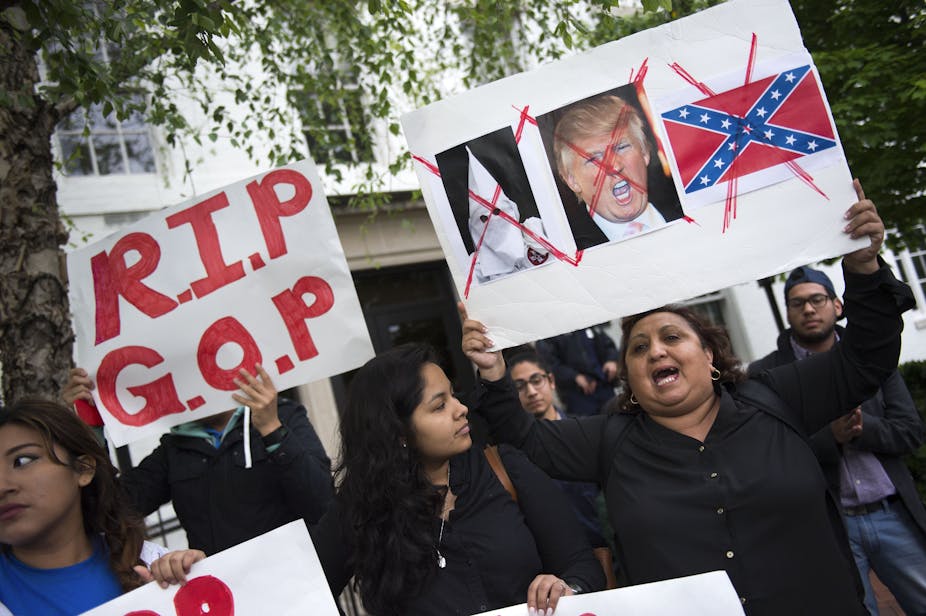Throughout the US’s 2016 presidential election, the polls have consistently shown that Republican candidate Donald Trump lags well behind Democratic rival Hillary Clinton among the country’s ethnic minorities. The 2016 electorate is the most diverse in American history and, if Clinton wins, this demographic change may be the deciding factor.
Mid-October polling showed that Clinton enjoyed a 79-point advantage over Trump among African-Americans, and is ahead by 28 points when it comes to Hispanic voters. Given what Trump has done over the past 18 months or so, this is anything but surprising.
Trump has accused undocumented Mexican migrants of rape, drugs and delinquency; questioned the integrity of a federal judge on the grounds of his Mexican heritage; declined an invitation to address the National Association for the Advancement of Colored People; insinuated that the Black Lives Matter movement has instigated police killings; and for years attacked the very legality of Barack Obama’s presidency on the basis of “birther” conspiracy theories.
This sort of talk is naturally anathema to the US’s Hispanic and African-American people and in the run-up to the election it’s become a grave strategic concern for the Republicans.
This is especially true when it comes to the Hispanic vote. Four key battleground states – Florida, Colorado, Nevada and Arizona – have populations more than 20% Hispanic. Combined, these states carry 55 of the 270 electoral votes Clinton needs to win, and so far, her prospects of capturing them all look good.
Trump almost certainly cannot win the presidency without Florida’s 29 electoral votes. The so-called Sunshine State’s population is 41.3% Hispanic and African-American – meaning that Trump’s only hope is severely low turnout among black voters and newly arrived Hispanic people, many of whom have fled the Puerto Rican debt crisis.
Trump also seems on course to lose Colorado, which Obama carried in both 2008 and 2012. Several things make this one a tall order for Trump: 37.5% of its population is college-educated, more than eight points higher than the national figure of 29.3%, whereas Trump relies heavily on less-educated voters – and overall, more than a quarter of the state’s population is either Hispanic or African-American.
Clinton is running strong in neighbouring Nevada, which has a substantial Hispanic population of 28.1% - and a state Obama carried twice. To the south, the usually deep red state of Arizona has this year entered the “toss-up” column and the two main candidates are locked in a virtual tie. A recent Monmouth University poll indicated that 65% of Arizona’s Hispanic voters favour Clinton over Trump.
There’s also another critical state where non-white voters could make the difference. North Carolina has an African-American population of 22.1%, and could certainly vote for Clinton if her campaign can drive up black turnout. Clinton has explicitly appealed to black voters throughout the campaign, lately accusing Trump of not acknowledging the “vibrancy” within the African-American community in the process. Early voting returns show that her efforts may already be paying off.
Long-term damage
Since 2012, the number of eligible Latino voters has increased by 4m, which accounts for 37% of the growth of eligible voters added to the US electorate. About 80% of the increase in the number of eligible Latino voters comes from the 3.2m US-born Latinos who’ve turned 18 since the last election.
These new voters will soon participate in the largest collective decision in American democracy for the very first time – and they are presented with a Republican candidate who has made a string of highly offensive remarks targeted specifically at them.

Meanwhile, young black voters who feel aggrieved over police brutality in America’s diverse inner-cities and racial discrimination in the criminal justice system are faced with a clear choice. One candidate has acknowledged the crisis and articulated a strong racial justice platform; the other would instruct his attorney-general to investigate Black Lives Matter.
Clinton is not adored by the masses – and the recent news of a renewed FBI probe into her emails may harm her with some voters. But the sheer strength of anti-Trump feeling among battleground states’ non-white citizens should help her pull together the 270 electoral votes she needs to win.
Republicans’ chief worry will be that Trump’s race problem will give the Democrats a lasting advantage. In an ever-diversifying liberal democracy where 63% of voters say the treatment of racial and ethnic minorities is a “top issue” for them, Trump isn’t just likely to lose; he has in all likelihood cost the Republicans a generation of voters.
The untold damage he has inflicted on his party by running a campaign like this in modern-day America may endure for years to come.

